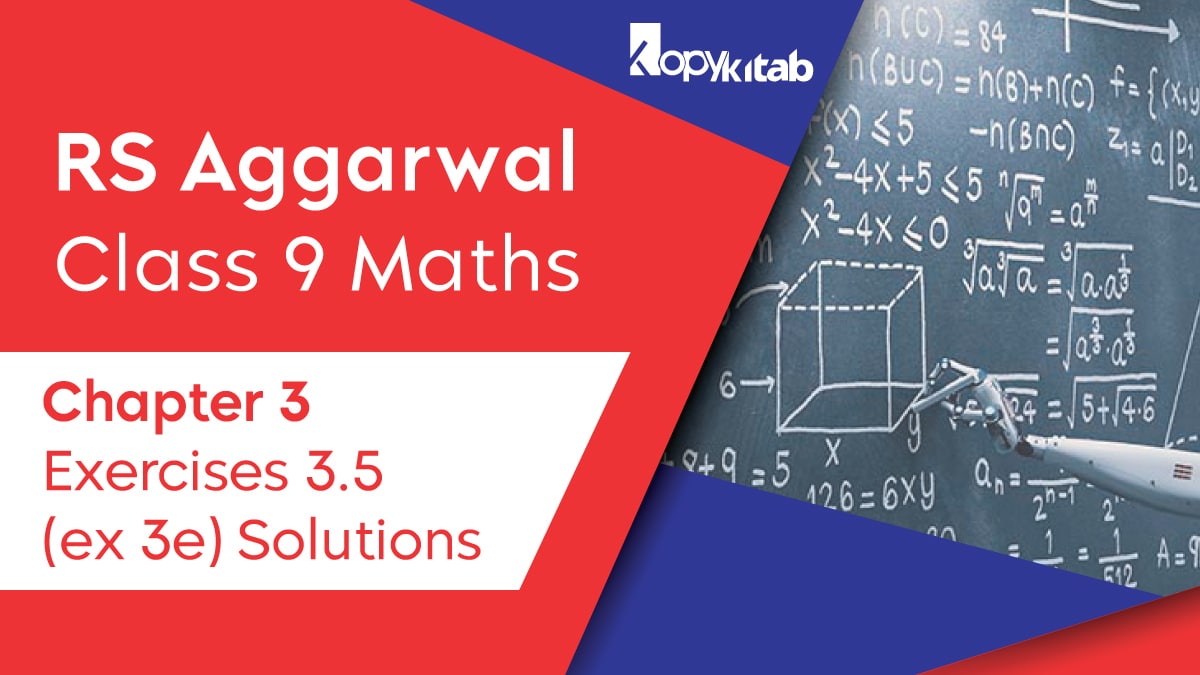RS Aggarwal Chapter 3 Class 9 Maths Exercise 3.5 Solutions: Some more algebraic identities are discussed in this chapter. It can be used in factoring and calculating certain expressions. Additionally, different polynomials based on the number of terms are discussed in this chapter. For Class 9 Maths Solutions Chapter 3 by KopyKitab. Agarwal Solutions has set a criterion for formulating and solving any type of question in the examination, regardless of the difficulty. Level.
The fifth exercise to find a binomial cube in Mathematics Chapter 3 Exercise 3E has 10 examples based on a descriptive form. Chapter 3 can be reviewed in less time using the Instasolve solution for Class 9.
Other exercises here.
Download RS Aggarwal Chapter 3 Class 9 Maths Exercise 3.5 Solutions
Important Definition for RS Aggarwal Chapter 3 Class 9 Maths Exercise 3.5 Solutions
Factorization: To precise a given polynomial as the item of polynomials each of degree less than that of the given polynomial such that no such a factor contains a calculated lower degree, is called factorization.
A polynomial can be spoken to as an item of polynomials with its degree less than or equal. Each polynomial that is included to discover the product is called a factor. A polynomial can be spoken to as an item of polynomials with its degree less than or rise to it.
Each polynomial that is included to discover the product is called calculates. The process included in breaking a polynomial and making it as a product of its figure is called the Factorisation of Polynomials.
Constants: Fixed numerical values of any symbol are called a constant.
i.e. 7, 3, -2, 3/7, etc. are all constants.
Variables: Any symbol that might assign to different numerical values are known as a variable.
C=2Πr i.e., (Circumference of a circle)
“r “- radius of circle Where 2 as constants. While “C” and “r” are variable
Algebraic expressions: Mixture of constants plus variables. Connected through few or all operations i.e., +, -, x and is known as an algebraic expression.
Coefficients: Within a polynomial x3 + 3×2 + 3x + 1 coefficient of x3, x2, x are 1, 3, 3 as shown and alongside the constant term in it will be +1.
Polynomial degree in one variable: The maximum power of the variable is known as the degree of the polynomial.
Constant polynomial: Polynomial when containing only one term, consisting of a constant term is called a constant polynomial. The degree of a non-zero constant polynomial is always zero.
Zero polynomial: A polynomial having only a single term, which is zero called a zero polynomial. A zero polynomial degree is not defined.
Zeros of a polynomial: Let us take “p(x)” as a polynomial. Where if then we can say the polynomial of p(x) is zero.
Remark: Searching zeros of polynomial p(x) ensure solving equations p(x) =0.
Remainder theorem: Let us assume f(x) as a polynomial of degree >0 and consider it as any real number. When f(x) is divided by f(x-a) then the remainder is f(a).
Use of a grouping method
Whenever a common factor exists between the groupings at that time factor polynomials are used.
The other two methods are by using special factoring formulas where you need to memorize for your exams; they include the formulas for factoring the sums and the differences of cubes. Here are the two formulas:
Factoring a Sum of Cubes:
a3 + b3 = (a + b) (a2 – ab + b2)
Factoring a Difference of Cubes:
a3 – b3 = (a – b) (a2 + ab + b2)
You’ll learn more as you move up in your advanced classes and you will learn how these formulas have come up.
Know more here.
